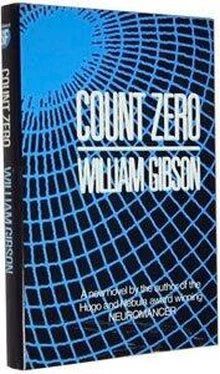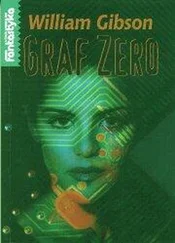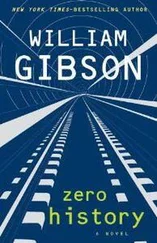They had arrived at the wall. It was made of glass, beaded heavily with condensation. A few centimeters beyond it was another wall, that one made of what looked like rusty sheet steel. Beauvoir fished a key of some kind from a pocket in his sharkskin robe and slid it into an opening in a bare alloy beam dividing two expanses of window. Somewhere nearby, an engine whined into life; the broad steel shutter rotated up and out, moving jerkily, to reveal a view that Bobby had often imagined.
They must be near the top, high up in the Projects, because Big Playground was something he could cover with two hands. The condos of Barrytown looked like some gray-white fungus, spreading to the horizon. It was nearly dark, and he could make out a pink glow, beyond the last range of condo racks.
“That’s the Sprawl, over there, isn’t it? That pink.”
“That’s right, but the closer you get, the less pretty it looks. How’d you like to go there, Bobby? Count Zero ready to make the Sprawl?”
“Oh, yeah,” Bobby said, his palms against the sweating glass, “you got no idea…” The derm had worn off entirely now, and his back and chest hurt like hell.
AS THE NIGHT came on, Turner found the edge again.
It seemed like a long time since he’d been there, but when it clicked in, it was like he’d never left. It was that super-human synchromesh flow that stimulants only approximated. He could only score for it on the site of a major defection, one where he was in command, and then only in the final hours before the actual move.
But it had been a long time; in New Delhi, he’d only been checking out possible escape routes for an executive who wasn’t entirely certain that relocation was what he wanted. If he had been working the edge, that night in Chandni Chauk, maybe he’d have been able to dodge the thing. Probably not, but the edge would’ve told him to try.
Now the edge let him collate the factors he had to deal with at the site, balancing clusters of small problems against sin-gle, larger ones. So far there were a lot of little ones, but no real ballbreakers. Lynch and Webber were starting to get in each other’s hair, so he arranged to keep them apart. His conviction that Lynch was Conroy’s plant, instinctive from the beginning, was stronger now. Instincts sharpened, on the edge; things got witchy. Nathan was having trouble with the lowtech Swedish hand warmers; anything short of an electronic circuit baffled him. Turner put Lynch to work on the hand warmers, fueling and priming them, and let Nathan carry them out, two at a time, and bury them shallowly, at meter intervals, along the two long lines of orange tape.
The microsoft Conroy had sent filled his head with its own universe of constantly shifting factors: airspeed, altitude, attitude, angle of attack, g-forces, headings. The plane’s weapon delivery information was a constant subliminal litany of target designators, bomb fall lines, search circles, range and release cues, weapons counts. Conroy had tagged the microsoft with a simple message outlining the plane’s time of arrival and confirming the arrangement for space for a single passenger.
He wondered what Mitchell was doing, feeling. The Mans Biolabs North America facility was carved into the heart of a sheer mesa, a table of rock thrusting from the desert floor. The biosoft dossier had shown Turner the mesa’s face, cut with bright evening windows; it rode about the uplifted arms of a sea of saguaros like the wheelhouse of a giant ship. To Mitchell, it had been prison and fortress, his home for nine years. Somewhere near its core he had perfected the hybridoma techniques that had eluded other researchers for almost a century; working with human cancer cells and a neglected, nearly forgotten model of DNA synthesis, he had produced the immortal hybrid cells that were the basic production tools of the new technology, minute biochemical factories endlessly reproducing the engineered molecules that were linked and built up into biochips. Somewhere in the Maas arcology, Mitchell would be moving through his last hours as their star researcher.
Turner tried to imagine Mitchell leading a very different sort of life following his defection to Hosaka, but found it difficult. Was a research arcology in Arizona very different from one on Honshu?
There had been times, during that long day, when Mitch-ell’s coded memories had risen in him, filling him with a strange dread that seemed to have nothing to do with the operation at hand.
It was the intimacy of the thing that still disturbed him, and perhaps the feeling of fear sprang from that. Certain fragments seemed to have an emotional power entirely out of proportion to their content. Why should a memory of a plain hallway in some dingy Cambridge graduate dormitory fill him with a sense of guilt and self-loathing? Other images, which logically should have carried a degree of feeling, were strangely lacking in affect: Mitchell playing with his baby daughter on an expanse of pale woolen broadloom in a rented house in Geneva, the child laughing, tugging at his hand. Nothing. The man’s life, from Turner’s vantage, seemed marked out by a certain inevitability; he was brilliant, a brilliance that had been detected early on, highly motivated, gifted at the kind of blandly ruthless in-company manipulation required by some-one who aspired to become a top research scientist. If anyone was destined to rise through laboratory-corporate hierarchies, Turner decided, it would be Mitchell.
Turner himself was incapable of meshing with the intensely tribal world of the zaibatsumen, the lifers. He was a perpetual outsider, a rogue factor adrift on the secret seas of inter-corporate politics. No company man would have been capable of taking the initiatives Turner was required to take in the course of an extraction. No company man was capable of Turner’s professionally casual ability to realign his loyalties to fit a change in employers. Or, perhaps, of his unyielding commitment once a contract had been agreed upon. He had drifted into security work in his late teens, when the grim doldrums of the postwar economy were giving way to the impetus of new technologies. He had done well in security, considering his general lack of ambition. He had a ropy, muscular poise that impressed his employer’s clients, and he was bright, very bright. He wore clothes well. He had a way with technology.
Conroy had found him in Mexico, where Turner’s employer had contracted to provide security for a Sense/Net simstim team who were recording a series of thirty-minute segments in an ongoing jungle adventure series When Conroy arrived, Turner was finishing his arrangements. He’d set up a liaison between Sense/Net and the local government, bribed the town’s top police official, analyzed the hotel’s security system, met the local guides and drivers and had their histories double-checked, arranged for digital voice protection on the simstim team’s transceivers, established a crisis-management team, and planted seismic sensors around the Sense/Net suite-cluster.
He entered the hotel’s bar, a jungle-garden extension of the lobby, and found a seat by himself at one of the glass-topped tables. A pale man with a shock of white, bleached hair crossed the bar with a drink in each hand. The pale skin was drawn tight across angular features and a high forehead; he wore a neatly pressed military shirt over jeans, and leather sandals.
“You’re the security for those simstim kids,” the pale man said, putting one of the drinks down on Turner’s table. “Alfredo told me.” Alfredo was one of the hotel bartenders.
Turner looked up at the man, who was evidently sober and seemed to have all the confidence in the world. “I don’t think we’ve been introduced,” Turner said, making no move to accept the proffered drink.
Читать дальше











